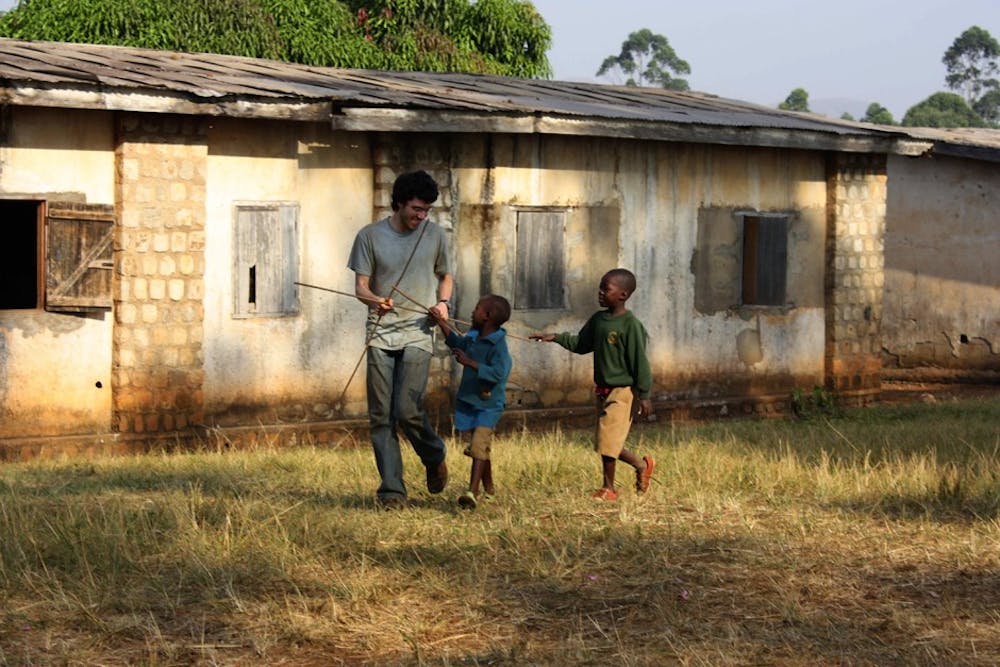
Max Heinritz, who graduated from the Wharton School and Engineering this year, travelled to Cameroon with a group of Engineering Without Borders volunteers.
As Penn engineers travel to destinations in China, Honduras and Cameroon, they learn more than just math and science. More often than not, they learn what it means to assimilate into a completely foreign culture.
The Global Biomedical Service program’s main focus is to reach out international communities. Each year, in partnership with Hong Kong’s Polytechnic University, 13 students travel with faculty to Hong Kong for two weeks where they treat disabled children throughout the area. Penn students fit the children for orthotics, usually leg braces, that they fabricate themselves. Many children that Penn volunteers work with have cerebral palsy and are unable to walk or even stand.
These children have very limited access to medical care. For those that do have access, many of them use outdated orthotics that no longer work because they are the incorrect size.
“That was one of the biggest things for me, seeing the patient and knowing that I made a difference,” Engineering senior Zameer Merchant said.
While the children benefited by receiving desperately needed medical care, Penn students were able to apply what they learned in the classroom to the real world.
“That was one of the best parts of the trip for me — to watch our students as the light bulb went off in their heads as they connected the material they learned in biomechanics and biomaterials with the design and construction of the orthotics,” Engineering professor Beth Winkelstein wrote in an email. “I was also struck with our students’ humanism in dealing with families, patients and our hosts.”
“It’s a very powerful experience for them, and it’s seeing the fruits of their labor, but they have a huge responsibility to do it right,” Engineering professor Dan Bogen added.
However, the process of preparing for the Hong Kong trip took longer than the trip itself.
Students spent seven weeks learning about the cultural history and geography of the region, as well as basic ideas of philosophy and religion. More importantly, students had to be educated on the “how-to’s” of fitting into Hong Kong culture, including things that they should not do or say.
A consultant was also hired by Penn to teach students about business customs in China. All students learned some of the basic tones and phrases in Chinese, as well as important phrases that they would need to use to navigate the country.
GBS’ main concern in aiding children in China is the sustainability of the treatment they complete during their two week stay. While disabilities are often stigmatized in China, the presence of American students makes the children’s disabilities more “newsworthy,” which promotes continued funding and research on these disabilities, Engineering professor Dan Bogen wrote in an email. Continued service is provided to these students by the Hong Kong Polytechnic University students, he added.
GBS is not the only group to cross borders for a good cause. Penn Engineers Without Borders is part of the larger non-profit Engineers Without Borders and works to develop “international sustainable development programs” ranging anywhere from implementing water distribution systems to irrigation and latrine projects, Engineering senior Elana Green wrote in an email.
However, Penn Engineers Without Borders faces a different set of challenges.
Apart from raising the funds to travel to different countries and adapting to new languages, members must always be cognizant of cultural differences.
“The most prominent [cultural differences] are those involving perceptions of time,” College senior Elizabeth Warren wrote in an email.
Warren, who volunteered in Cameroon, experienced a looser perception of time where there was never a rush to complete tasks.
“For all of the cultural nuances, it is incredibly important that we collaborate with [community organizations] because they are able to inform us of how we come across and also educate us in the best ways to work with the community in a respectful manner,” she added.
The Daily Pennsylvanian is an independent, student-run newspaper. Please consider making a donation to support the coverage that shapes the University. Your generosity ensures a future of strong journalism at Penn.
DonatePlease note All comments are eligible for publication in The Daily Pennsylvanian.





